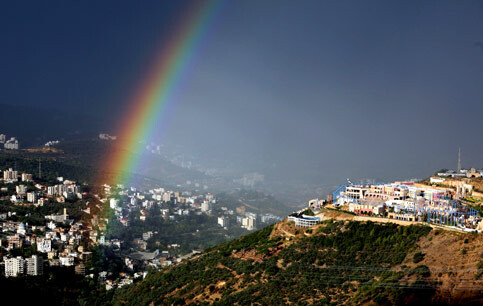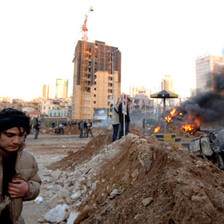Beirut 5 March 2007

Rainbow over Beirut, from the hills to the road to Bekka valley, Lebanon, 6 October 2006. (Manoocher Deghati/IRIN)
Most of the posts in the Lebanese blogosphere reflect the atmosphere of anxiety, pessimism and mistrust that is the general mood of the Lebanese nowadays. Here is a summary of some of the posts. An attempt has been made to include one or two light posts with brighter outlooks, but they did not drown the overall disposition mentioned above. Anyway, here we go:
Let’s begin by mentioning Lebanon’s loss of Joseph Samaha, a very prominent columnist and political analyst, last week. Many bloggers posted about the man and his works. Jamal Ghosn wrote a post about Samaha which he began with:
Life Goes On, but it must not go on dumber, less informed, mentally poorer. We were privileged to have our collective minds enriched on a daily basis by a ten minute read each morning that encapsuled decades of knowledge, a philosophical library, and a strategic eye that saw beyond all horizons. No single pen can replace these lines. We, each of us, must make up a little of this loss on our own.It may be difficult to imagine that the Lebanese could be in the mood for love songs after hearing the news coming out of Lebanon, but that is not the case according to this post at A Diamond’s Eye View of the World, whose observation may lead us to imagine Beirut as a city enveloped in a cloud of music:
Lebanon is musical in the sense that wherever one goes, one hears music — in cars driving past, restaurants, and wafting down from apartments. My favorite musical moments come in the early mornings, as I pass soldiers stationed at various points around the city. They play music on their mobile phones — the latest Arabic love songs and the latest US hip-hop tracks. Each man I walk by is enveloped by his own little cloud of song. Men break into song here — phrases of old ballads, choruses of old love songs — when women walk past on the street. Much, much, much nicer than any catcall, or even than such memorable New York phrases as “God bless you and the mother who bore you”.Moving on to politics, Sophia sees that the new US foreign policy ‘turn’ to stabilize Iraq, by convening a conference, is taking its closest allies in the Middle East by surprise. After a lengthy analysis of the subject, she states that:
There is no turn in the recent moves we are witnessing in US foreign policy. What we are witnessing is an administration weakened abroad and at home, trying to pursue its belligerent policy by other means, even if it means doing so on the expense of the stability of the entire ME.A new wave of optimism, albeit mixed with pessimism, is spreading in Lebanon because of the Iranian-Saudi summit as well as the forthcoming Arab summit. Abu Kais elaborates on the apparent alternatives that the parties have in case the summits fail:
A wave of cautious optimism struck the Lebanese political scene in the days preceding the Iranian-Saudi summit in Riyadh. Reports of an impending settlement to the “Lebanese file” before the March 28th Arab summit have invaded the Lebanese media. However, both parties to the conflict are waving a “plan B” should the Saudis and Iranians fail to agree on the details. […] I think we’re looking at a de-facto partitioning of the country and collapse of the army, and one or two governments claiming legitimacy. Chaos is the best anti-dote to rule of law, and the Hariri tribunal.The Grateful Arab sheds light on the current state of affairs in Lebanon via a historical perspective, and in addition to suggesting solutions to the problems he describes Lebanon today as:
a huge Labyrinth, and all of us are lost in it, especially those who pretend they are not because of their strong convictions. We are unable to reach the center, wandering aimlessly instead, trying to find our way. Some of us become discouraged and head for the exit never to return. Others get tired after a while and decide to just stay in the dead end they have reached, either ignoring or fighting people stuck in different dead ends.Some of the Lebanese leaders are visiting the US and meeting with president Bush and other US officials. They have been promised help by these officials, but Leila comments on these promises and on other “CIA black ops” in Lebanon and in the region:
America’s current leaders are sick, deluded and foolish, and any Lebanese who believe that such people will protect them or help them are just delusional.Finally, Angry Anarchist describes the city she loves in a hilarious, critical and why-do-I-love-to-hate-Beirut post. Here are two samples of the reasons:
1- The Beirut of (the dead) Arabism whose inhabitants insist that Arabism is alive and kicking while chanting “Allah, Hariri, Tarik Jdide” or “Allah, Nasrallah, wl Dahiye kella” or “Aounak jeyi min Allah?” etc etc. Lest you think we are not diverse, we also are home to a sizeable population of clowns who insist Beirut is (not was) Phoenician, and that Lebanon is god’s chosen country. Not only did these people prove that god exists, they also know that it is god’s chosen country. Tell me, how, how? can one not love this city?Stay well and see you next week.2- The Beirut of racism. “I got me a Sri Lankan maid today”, “I retrieved my escaped maid today”, “dirty Syrians”, “dirty Palestinians”, and the latest trend but definitely not a new phenomenon, “dirty Shi’ite”.
Global Voices Online is a non-profit global citizens’ media project, sponsored by and launched from the Berkman Center for Internet and Society at the Harvard Law School.
Related Links





